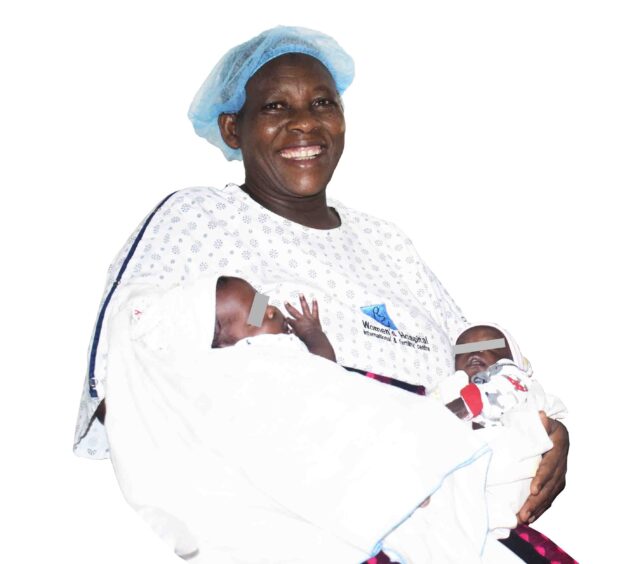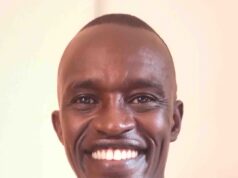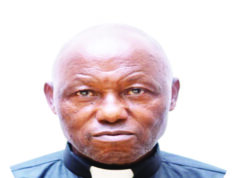By Justine Namara
Safina Namukwaya is the first woman in Africa to give birth at 70 years old. She welcomed her twins; a son and a daughter, on November 29, 2023 at Women’s Hospital International and Fertility Centre, Bukoto in Kampala. This is Namukwaya’s second delivery after giving birth to her first child in 2020 while she was 67 years old. Her story, as she shared with the Good News paper, is of strength, resilience and above all, faith in God.
Endless wait for a baby
Namukwaya, a resident of Nunda Village, Lwabenge parish in Kalungu district, had endured public humiliation and mockery by her village mates as a cursed woman because of being childless.
In 1973, Namukwaya who was only 15 years old got married to her first husband. She conceived a few months later, unfortunately at 22 weeks, she suffered a miscarriage.
This marked the beginning of her painful struggle to become a mother, yet she could not conceive again. After seeking medical attention, she was diagnosed with blocked fallopian tubes.
The childless marriage was beginning to cause a rift between her and her husband who decided to get another wife and had nine children with.
Namukwaya who now believes God acknowledged her pure heart, says she cared for her co-wife’s children like her own.
“I cared for these children without envy or jealousy, and I know surely God has paid me back with my own, and more so with twins. I am a happy Nalongo,” excited Namukwaya says.
She says her co-wife’s children are now adults who also supported her during her struggle to get her biological children.
Sadly, her husband later fell sick and died, leading to her subsequent relationship with her current husband, Badru Walusimbi, who married her regardless of her inability to have children.
The couple spent about 25 years without any child, but kept hoping and searching for possible medical solutions to her barrenness.
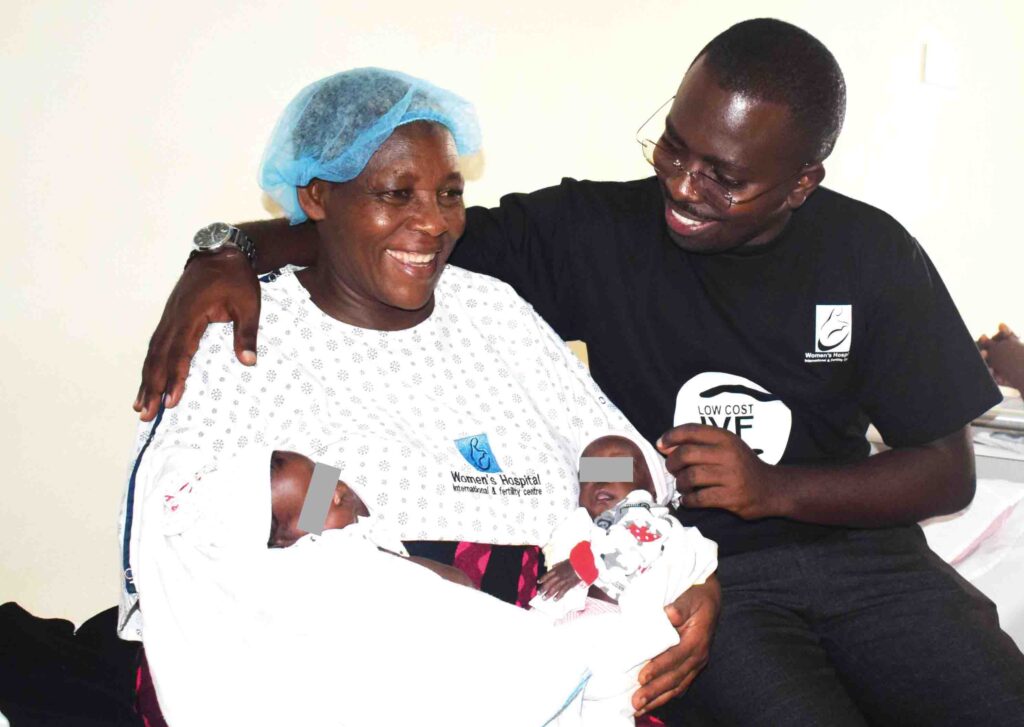
Getting their first child
“I was conversing with a friend and she told me about Dr Edward Sali. She told me that this doctor could help me have children even if I was old. I decided to try,” Namukwaya says.
In July 2018, she visited Women’s Hospital International and Fertility Centre, Bukoto, and the doctors confirmed she had blocked fallopian tubes.
She also emphasized her desire to have children and was assured by Dr Sali that “There is nothing impossible for God.”
“He told me that they were going to sort the problem of the tubes and would later start the process of having a child,” she says, adding that she was started on treatment and to her shock, she was able to menstruate again.
“In November 2019, I conceived through IVF. Five embryos were transferred to my womb and I conceived. When I tested in December, I was six weeks pregnant. We were so excited,” Namukwaya says.
IVF (In vitro fertilization) is a process of conception where a woman’s eggs are combined with a man’s sperm outside the human body, in a laboratory dish (in vitro).
The process involves monitoring and stimulating a patient’s ovulatory process, removing an ovum or ova from their ovaries and letting sperm fertilise them in a culture medium in a laboratory.
When she was 36 weeks pregnant, in June 2020, Namukwaya started developing complications such as swelling of her body and difficulty in breathing.
To save her life and the baby’s, a C-section was performed through which she delivered a baby girl.
Her firstborn was delivered at Masaka Regional Referral Hospital because of the Covid-19 lockdown that hindered transport to the fertility centre in Kampala. Her first daughter, Sarah Nanteza, is now three years old.
“God answered my prayers. Those who mocked me for being barren could not believe it when they saw me pregnant and later have a child,” she says.
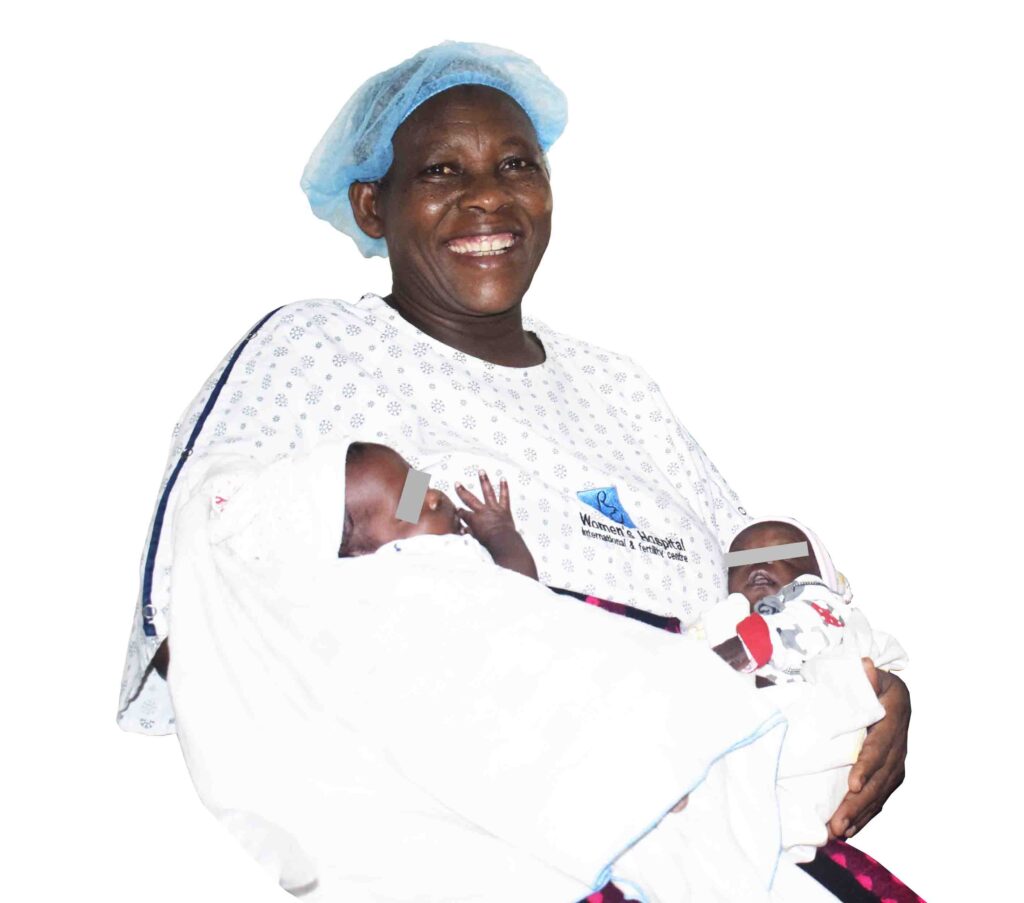
Search for second child
“When Covid lockdown was lifted, I travelled to the fertility centre to take the baby to Dr Sali. When we were talking, he said that I should try again to have a second child. I gave it thought because having one is risky,” Namukwaya says.
What is interesting is that she trusted that if God had let it happen the first time, He could still let it happen again.
So, they started the financial preparation in order get ready to cater for the second process. In 2022, they visited the fertility centre again for more tests and in early 2023, she was helped to conceive again through IVF.
Asked whether she did not fear the process given her advance age, Namukwaya said she was driven by hope and strong belief in God.
“Also, Dr Sali kept encouraging me to trust in God. Whenever we met, he prayed for me and I got more faith,” she adds.
When she found out she was having twins, Namukwaya says she was dumbfounded.
“It was unbelievable. God doubled the blessing,” she says. However, due to complications again, the babies had to be delivered earlier and put under incubation. The boy and girl weighed 1.7 kilograms each.
At the time of this interview, Namukwaya was still at the fertility centre because one of the babies needed more medical attention.
Our journalist found her breastfeeding. However, she says the breasts are not expressing enough milk. So, they have to compliment with formula milk.
The twins’ are named Shakira Babirye (girl) and Shafik Kato (boy). Namukwaya encourages women struggling with childlessness to keep their hope in God who answers prayers.
Biblical late mothers
The focus and preoccupation with childlessness in the Bible fall solely and consistently on women. Moreover, childlessness is never presented as a positive or acceptable condition.
The good news is that every story of a childless woman in the Bible has a good ending. God always intervened on their behalf and gave them children.
Something God has continually done through categorical means of prayer and faith and scientific innovations like IVF through which Namukwaya conceived.
The following women were able to conceive after a long time of childlessness:
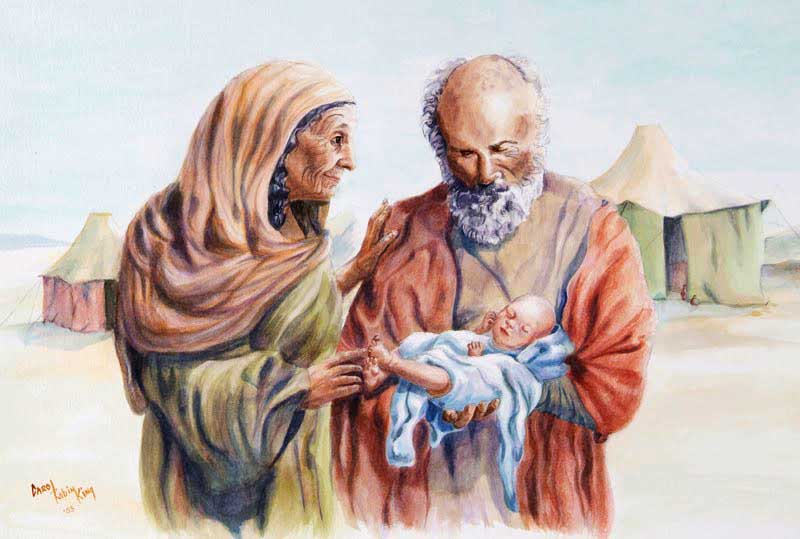
Sarah and Abraham
“Despite God’s promise, years went by and still Abram’s wife, Sarai, remained childless (Genesis 16:1).
But, “When Abram was 99 years old, the Eternal One appeared to him again, assuring him of the promise of a child yet to come (Genesis 17:1).”
How awesome is that?! She was already 90 years old when this promise was made to Abraham. And, of course, God kept His promise, Sarah gave birth to Isaac (Genesis 21:1).
We agree this was a miracle, given it cannot be explained scientifically. Is anything too difficult for the Eternal One?
Isaac and Rebekah
Isaac, Abraham and Sarah’s son, prayed to the Eternal One on behalf of his wife because she wasn’t becoming pregnant (Genesis 25:21).
The Lord granted his prayer. After twenty years of infertility, Rebekah conceived and gave birth to twins (Jacob and Esau). Once again, God’s timing is vastly different from our own.
Rachel
Jacob, Isaac and Rebekah’s younger son married sisters Leah and Rachel. Leah had six sons and one daughter, while the Lord closed Rachel’s womb.
Rachel complained often to her husband about her infertility, saying, “I will just die if you don’t give me children” (Genesis 30:1).
Jacob and Rachel even argued about this. The Bible tells us that Jacob became angry with Rachel, saying: “Am I God? He’s the One responsible for you not getting pregnant, not me” (Genesis 30:2).
Even back then, infertility caused stress on marriages! Finally, scripture tells us that “God remembered Rachel. She conceived and gave birth to her first son Joseph (Genesis 30:22).
Manoah’s wife
Though Scripture does not name her, it tells us that, “Manoah, from the tribe of Dan was married to a wife who could not bear him children (Judges 13:2).
A messenger of the Lord came to Manoah’s wife, and told her that she would give birth to a son.
He told her never to use a razor on his head, because she will raise the boy as a Nazirite, dedicated to the true God, and he will be the one to begin delivering Israel from the Philistines.
Sound familiar? Manoah’s wife, who was barren, gave birth to Samson.
Hannah and Elkanah
Hannah prayed year after year for children. She was often consumed with thoughts of infertility and was so distraught that she could not eat.
The Bible tells us that she was heartbroken, and she began to pray to the Eternal One, weeping uncontrollably (1 Samuel 1:9-10).
When Eli saw her praying (she was weeping, and her lips were moving, but words were not coming out).
He rebuked her for being drunk. Hannah had to explain to him that she was not drunk, but that she had been pouring out the pain in her soul before the Eternal One (1 Samuel 1:15).
Out of all of the stories I have read about infertility in the Bible, Hannah’s is the one that resonates the loudest.
The Bible clearly portrays the depths of her emotion, physical, and spiritual pain. But eventually, God remembered her petition, and she became pregnant with Samuel.
After giving birth to Samuel, Hannah conceived and gave birth to three sons and two daughters. Samuel eventually became the last and greatest judge of Israel.
Shunammite Woman
The Bible does not even tell us this woman’s name. We only know that she was kind and hospitable to the prophet Elisha.
She was barren, but Elisha promised her that in exchange for her good service to him, she would conceive a son.
Although the woman claimed that such would be impossible, she held her son in her arms one year after Elisha prophesied over her (2 Kings 4:16-17).
Elizabeth and Zechariah
We learn in Luke 1:6 that Elizabeth and Zechariah were good and just people in God’s sight.
But they had no child due to Elizabeth’s infertility, and they were both past childbearing years. There are just so many impressive things about this story.
First, Elizabeth’s son was being born to fulfill a prophecy. He was being born as the Lord’s forerunner, the one who would prepare the people and make them ready for God (Luke 1:17).
After years of infertility, Elizabeth became the mother of John the Baptist.
“In each of these stories, God used infertility to show His miraculous power and to carry out His plan for human history.
Namukwaya’s story is not different from these women, after over 20 years of waiting, she now has three children of her own.
















